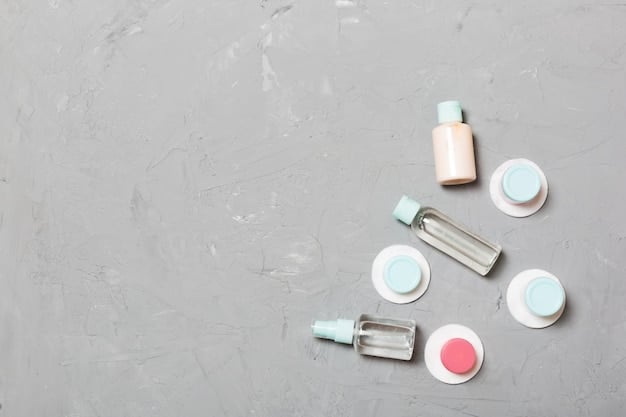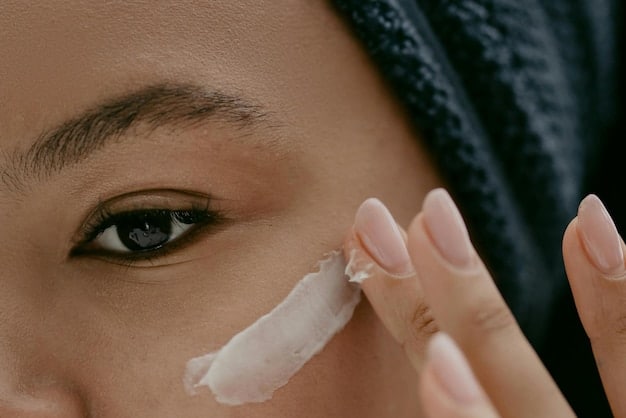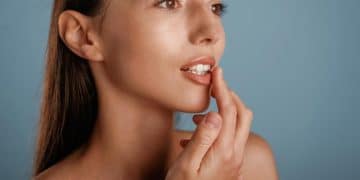The Ultimate Guide to Hydrated Skin: Expert Tips and Product Recommendations

Achieving and maintaining deeply hydrated skin is crucial for a healthy complexion, requiring a strategic combination of expert-backed skincare routines, essential product selections, and lifestyle adjustments that nourish the skin barrier for lasting radiance and resilience.
In the expansive universe of skincare, few goals are as universally sought after and fundamental as achieving truly hydrated skin. Far from being a mere aesthetic concern, optimal skin hydration is the cornerstone of a healthy, resilient, and radiant complexion. This isn’t just about splashing water on your face; it’s a sophisticated interplay of internal and external factors, demanding a knowledgeable approach that aligns with your skin’s unique needs. This comprehensive guide, The Ultimate Guide to Hydrated Skin: Expert Tips and Product Recommendations, delves deep into the science, the strategies, and the standout products that can transform your skin from parched to perfectly plump, ensuring a glow that comes from within.
Understanding Skin Hydration: More Than Just Water
Many believe hydrated skin simply means drinking enough water, but the reality is far more intricate. Skin hydration refers to the water content within the skin cells, particularly in the outermost layer, the stratum corneum. This water content is vital for maintaining the skin barrier function, which acts as our body’s primary defense against environmental aggressors and prevents excessive transepidermal water loss (TEWL). When this barrier is compromised due to dehydration, skin can become dry, flaky, itchy, and more susceptible to irritation and premature aging.
The skin’s ability to retain moisture is influenced by several factors, including genetics, age, diet, environmental conditions, and the skincare products we use. Understanding these elements is the first step towards developing an effective hydration strategy. A healthy skin barrier is plump, smooth, and reflects light evenly, contributing to a vibrant, youthful appearance. Conversely, dehydrated skin can appear dull, tight, and show fine lines more prominently.
The Difference Between Dry Skin and Dehydrated Skin
It’s common to confuse dry skin with dehydrated skin, but they are fundamentally different conditions. Understanding this distinction is crucial for selecting the correct treatments and products. Dry skin is a skin type, meaning it genetically lacks oil (sebum) production. Individuals with dry skin often experience a persistent feeling of tightness, flakiness, and may be prone to conditions like eczema. Their skin barrier is typically weakened due to insufficient lipids.
- Dry Skin: Lacks oil; a skin type.
- Dehydrated Skin: Lacks water; a skin condition that can affect any skin type, including oily skin.
- Common Symptoms: Dry skin feels rough and scaly; dehydrated skin can feel tight and look dull or congested.
- Treatment Approach: Dry skin needs emollients and rich moisturizers; dehydrated skin needs humectants and barrier-repairing ingredients.
Dehydrated skin, on the other hand, is a condition where the skin lacks water, regardless of its oil production. Even oily skin can be dehydrated, often leading to increased oil production as the skin attempts to compensate for the lack of moisture. This can exacerbate issues like breakouts. Recognizing whether your skin is dry or dehydrated allows for a targeted and more effective approach to restoration.
Maintaining proper hydration is a dynamic process. It requires consistent effort and a holistic view of skincare, encompassing both topical applications and lifestyle choices. The goal isn’t just to add water to the skin, but to ensure that water is effectively trapped within its layers, supporting the barrier’s integrity and overall skin health.
Key Ingredients for Optimal Skin Hydration
The marketplace is flooded with products promising hydration, but only a select few ingredients genuinely deliver. Understanding the science behind these components allows for informed choices that profoundly impact skin health. These ingredients work synergistically or individually to either draw moisture into the skin, seal it in, or repair the skin’s natural barrier, preventing water loss.
When curating a hydration-focused routine, prioritize formulations that feature these powerhouses. They are the backbone of any effective strategy to combat dehydration and maintain a supple, healthy complexion. It’s not just about applying products; it’s about applying the *right* products at the right time, allowing these ingredients to perform their best.
Humectants: The Moisture Magnets
Humectants are substances that attract water from the air and deeper layers of the skin, binding it to the skin’s surface. They are essential for providing immediate plumping and alleviating tightness associated with dehydration. Their ability to draw moisture helps to improve skin elasticity and reduce the appearance of fine lines.
- Hyaluronic Acid (HA): A superstar humectant capable of holding up to 1,000 times its weight in water. It comes in various molecular weights; lower weights penetrate deeper, while higher weights hydrate the surface.
- Glycerin: A highly effective and affordable humectant that draws moisture and strengthens the skin barrier. It’s often found in many hydrating formulations.
- Urea: Not only a humectant but also a mild exfoliant, especially effective for very dry or rough skin.
- Sodium PCA: A natural moisturizing factor (NMF) component, it’s highly water-absorbent and helps maintain skin’s internal hydration.
Using humectants on damp skin is particularly effective, as it provides a source of water for them to draw from. Layering them under an occlusive or emollient moisturizer helps to lock in the moisture they attract, preventing it from evaporating.
Emollients and Occlusives: The Moisture Sealers
While humectants attract water, emollients and occlusives work to seal that moisture into the skin. Emollients smooth and soften the skin by filling in the gaps between skin cells, while occlusives form a physical barrier on the skin’s surface to prevent transepidermal water loss (TEWL).
- Ceramides: Essential lipids that make up a significant portion of the skin barrier. They help skin cells bind together, preventing water loss and protecting against irritants.
- Squalane: A lightweight, non-comedogenic emollient that mimics the skin’s natural oils, offering excellent moisture without greasiness.
- Shea Butter & Cocoa Butter: Rich emollients that provide significant barrier support and deep nourishment, ideal for very dry skin types.
- Petrolatum (Vaseline): One of the most effective occlusives, forming a potent barrier to drastically reduce TEWL.
- Mineral Oil: Another effective occlusive, non-comedogenic and well-tolerated by most skin types.
A balanced skincare routine for hydration will often combine these ingredient types. For example, a serum rich in hyaluronic acid might be followed by a moisturizer containing ceramides and squalane, topped off with a thin layer of an occlusive at night, especially in dry environments. This multi-layered approach ensures both adequate water content and its retention within the skin.
Crafting Your Daily Hydration Skincare Routine
A well-structured skincare routine is non-negotiable for achieving and maintaining optimal skin hydration. It’s a strategic dance of cleansing, treating, and protecting that ensures every step contributes to a plump, healthy complexion. Consistency is key, alongside choosing products specifically formulated to support the skin’s natural barrier.

Don’t be tempted to skip steps or overload your skin. A streamlined, effective routine focuses on quality over quantity, allowing potent ingredients to work without overwhelming the skin barrier. Remember that while products are vital, they work best when supported by a healthy lifestyle.
Morning Routine for Hydration
The morning routine focuses on protecting your skin from environmental stressors and ensuring it stays hydrated throughout the day. It sets the tone for your skin’s resilience against dryness and pollution.
- Gentle Cleansing: Start with a mild, hydrating cleanser. Avoid harsh foaming cleansers that strip natural oils. A cream or hydrating gel cleanser will remove impurities without compromising the skin barrier.
- Hydrating Toner or Essence: Applying a toner or essence immediately after cleansing helps to rebalance skin pH and adds an initial layer of hydration. Look for formulations with humectants like hyaluronic acid.
- Antioxidant Serum: A serum rich in antioxidants (e.g., Vitamin C) not only protects against free radical damage but also often contains hydrating ingredients that boost moisture retention.
- Moisturizer: Apply a daily moisturizer appropriate for your skin type. For dry or dehydrated skin, opt for richer creams with ceramides, squalane, or glycerin.
- Sunscreen: Non-negotiable. Choose a broad-spectrum SPF 30+ sunscreen. Many sunscreens now include hydrating ingredients, offering dual benefits.
The order of application is critical to allow products to penetrate effectively and layer synergistically. Thinner products typically go on first, followed by thicker ones, with sunscreen always being the final step in the morning.
Evening Routine for Deep Hydration and Repair
The evening is your skin’s prime repair time. This routine focuses on intense hydration, barrier repair, and nourishing treatments that work while you sleep. It’s an opportunity to replenish lost moisture and restore skin health.
- Double Cleansing (Optional but Recommended): Start with an oil-based cleanser to remove makeup and sunscreen, followed by a gentle water-based cleanser to cleanse the skin thoroughly without stripping it.
- Hydrating Toner or Essence: Again, providing a base layer of hydration helps subsequent products absorb better.
- Targeted Treatment Serum: This is where you can incorporate serums with potent hydrating actives like higher concentrations of hyaluronic acid or reparative ingredients like peptides.
- Moisturizer (Richer Formulation): Use a richer night cream or sleeping mask. These products are often formulated with higher concentrations of emollients and occlusives to provide sustained hydration and barrier support overnight.
- Facial Oil (Optional): If your skin is particularly dry, a few drops of a nourishing facial oil can be pressed over your moisturizer to provide an extra layer of occlusion and lock in moisture.
Paying attention to the textures and ingredients ensures that each step contributes meaningfully to your skin’s hydration levels. Over time, this consistent approach will lead to a visibly healthier, more resilient, and deeply hydrated complexion.
Lifestyle Factors Impacting Skin Hydration
While topical skincare is crucial, true skin hydration is a holistic endeavor. Your daily habits and environment play a significant, often underestimated, role in your skin’s ability to retain moisture. Addressing these lifestyle factors can enhance the efficacy of your skincare routine and provide a lasting foundation for healthy skin.
Ignoring these internal and environmental influences is like trying to fill a leaky bucket; no matter how much product you apply, your skin will struggle to maintain optimal hydration. A conscious effort to integrate these healthy habits into your daily life can yield remarkable improvements.
Diet and Nutrition for Hydrated Skin
What you consume profoundly affects your skin from the inside out. A diet rich in certain nutrients can support skin barrier function and overall hydration.
- Water Intake: This is foundational. Aim for at least 8 glasses of water daily to ensure systemic hydration, which subtly reflects in skin plumpness.
- Healthy Fats: Omega-3 and omega-6 fatty acids (found in fatty fish, flaxseeds, walnuts) are vital for maintaining the lipid barrier. These fats help to reduce inflammation and keep the skin supple.
- Antioxidant-Rich Foods: Berries, leafy greens, and colorful vegetables protect skin cells from damage caused by free radicals, which can compromise the skin barrier and lead to dehydration.
- Vitamins and Minerals: Vitamin A (retinoids, beta-carotene), Vitamin E, and Zinc are particularly important for skin health and repair processes.
Conversely, excessive consumption of processed foods, high sugar, and alcohol can contribute to inflammation and dehydration, detracting from your skin’s vitality. Prioritizing whole, nutrient-dense foods is an investment in your skin’s long-term health.
Environmental and Behavioral Factors
Your surroundings and habits can either support or sabotage your hydration efforts. Being mindful of these external pressures allows you to implement protective measures.
- Humidity Levels: Low humidity (especially indoors with heating or AC) can rapidly draw moisture from your skin. Using a humidifier, particularly in your bedroom, can significantly help.
- Hot Showers: While tempting, prolonged exposure to hot water strips the skin of its natural oils, leading to increased dryness and dehydration. Opt for lukewarm water and keep showers brief.
- Over-Exfoliation: Excessive use of harsh physical or chemical exfoliants can compromise the skin barrier, leading to heightened water loss and sensitivity. Exfoliate gently and infrequently.
- Stress: Chronic stress can impact hormone levels and increase inflammation, both of which can negatively affect skin barrier function and hydration. Practicing stress reduction techniques can have a positive ripple effect on your skin.
- Smoking: Smoking severely dehydrates the skin, constricts blood vessels, and breaks down collagen and elastin, accelerating aging and contributing to a dull, parched complexion.
Each of these factors contributes to the delicate balance of skin hydration. By addressing your diet, maintaining a comfortable environment, and adopting healthier habits, you create an optimal internal and external ecosystem for your skin to thrive, making it easier to achieve and maintain that coveted hydrated glow.
Top Product Recommendations for Hydrated Skin
Navigating the vast array of skincare products can be daunting, but certain formulations stand out for their efficacy in promoting and maintaining skin hydration. These recommendations are based on their ingredient profiles, proven results, and expert endorsements, offering a starting point for building your ultimate hydration arsenal.
It’s important to remember that individual skin types and concerns vary. What works wonders for one person might not be the perfect fit for another. However, these products represent a strong foundation that addresses common hydration needs and are generally well-tolerated across different skin types. Always patch test new products to ensure compatibility.
Cleansers That Don’t Strip
A hydrating routine begins with the cleanse. The goal is to remove impurities without disturbing the skin’s natural moisture barrier.
- CeraVe Hydrating Facial Cleanser: A classic for a reason. Formulated with ceramides and hyaluronic acid, it cleanses effectively while maintaining the skin’s protective barrier.
- La Roche-Posay Toleriane Hydrating Gentle Cleanser: Soap-free, sulfate-free, and rich in niacinamide and ceramides, this cleanser is ideal for sensitive and dry skin types, leaving skin feeling soft and clean, not tight.
- Fresh Soy Face Cleanser: A gentle, pH-balanced gel cleanser that removes makeup and impurities while soothing and hydrating with soy proteins and rosewater.
These cleansers ensure that your skin is prepared for subsequent hydrating steps, rather than being left vulnerable and parched after washing.
Power-Packed Hydrating Serums
Serums are concentrated formulations designed to deliver a potent dose of active ingredients deep into the skin.
- The Ordinary Hyaluronic Acid 2% + B5: An affordable yet effective serum that combines multiple molecular weights of hyaluronic acid with Vitamin B5 for enhanced surface and deeper hydration.
- SkinCeuticals Hydrating B5 Gel: A luxurious gel with hyaluronic acid and Vitamin B5, known for its ability to replenish nutrients and bind moisture to the skin, making it feel smoother and more supple.
- Vichy Minéral 89 Hyaluronic Acid Face Serum: This serum features 89% Vichy Volcanic Water and hyaluronic acid, strengthening the skin barrier and protecting it from environmental aggressors.
Applying these serums to damp skin can further maximize their hydrating potential, as humectants perform best when they have moisture to draw from.
Moisturizers for Locked-In Hydration
Moisturizers are critical for sealing in moisture and reinforcing the skin barrier, creating a protective layer that lasts throughout the day or night.

- Kiehl’s Ultra Facial Cream: A lightweight yet deeply hydrating cream that provides 24-hour moisture, even in harsh weather, with glacial glycoprotein and squalane.
- Augustinus Bader The Rich Cream: While a splurge, this cream is renowned for its patented TFC8® technology, which supports skin regeneration and provides intense hydration and barrier repair, ideal for dry and mature skin.
- Paula’s Choice Omega+ Complex Moisturizer: Packed with omega fatty acids, ceramides, and antioxidants, it restores and strengthens the skin’s moisture barrier, reducing dryness and redness.
For individuals with very dry skin, layering a facial oil over a moisturizer at night can provide an additional occlusive barrier, preventing moisture loss while you sleep. The key is to find formulations that feel comfortable on your skin and deliver sustained hydration without causing congestion or irritation.
Advanced Strategies for Stubborn Dehydration
Even with a solid routine, some individuals face persistent dehydration. This often requires a deeper dive into advanced treatments and complementary techniques that go beyond daily product application. These strategies aim to address underlying issues, supercharge hydration, and provide more intensive barrier repair.
When daily efforts aren’t quite enough, it’s time to consider these specialized approaches. They can be integrated into your routine on a weekly or occasional basis, providing an extra boost to tackle stubborn dry patches, flakiness, or a pervasive feeling of tightness.
Weekly Masks and Treatments
Face masks and targeted treatments can deliver a concentrated burst of hydrating ingredients, providing immediate relief and long-term benefits.
- Hydrating Sheet Masks: Infused with serums rich in hyaluronic acid, ceramides, and botanical extracts, sheet masks offer a quick and effective way to plump the skin. Use 1-2 times a week.
- Sleeping Masks (Overnight Masks): These thicker, occlusive masks are designed to be left on overnight. They create a protective layer that prevents TEWL and allows active ingredients to penetrate deeply, waking up to dramatically softer and more hydrated skin.
- Exfoliating Acids (Gentle): While over-exfoliation causes dehydration, gentle exfoliation with AHAs (e.g., lactic acid) or PHAs can remove dead skin cells that prevent hydration from penetrating. This should be done judiciously, 1-2 times a week, followed by intense hydration.
Always follow exfoliation with a potent hydrating serum and a rich moisturizer to replenish the skin barrier. The aim is to create a smooth surface for optimal product absorption, not to strip the skin.
Professional Treatments and Consultations
For chronic dehydration or if you’re unsure about the best approach, professional guidance can be invaluable.
- Dermatologist Consultation: A dermatologist can diagnose underlying causes of dehydration (e.g., eczema, rosacea, medication side effects) and recommend prescription-strength treatments or in-office procedures.
- Hydrating Facials: Many spas offer facials specifically designed to boost hydration. These often involve gentle exfoliation, steam, hydrating masks, and lymphatic massage, leaving the skin plump and radiant.
- HydraFacial: A popular multi-step treatment that cleanses, exfoliates, extracts, and hydrates the skin using serums infused with antioxidants, peptides, and hyaluronic acid. It provides immediate and noticeable hydration.
- Injectable Hydration (Skin Boosters): For very severe cases, some treatments involve injecting non-cross-linked hyaluronic acid directly into the skin to improve hydration from within. This is a more invasive option requiring medical supervision.
Discussing your concerns with a dermatologist ensures that any advanced treatment is appropriate for your skin condition and aligns with your overall skincare goals. An expert eye can often identify subtle issues that might be hindering your hydration efforts, guiding you toward a more personalized and effective solution.
Troubleshooting Common Hydration Issues
Even with the best intentions and products, you might encounter bumps on your journey to perfectly hydrated skin. Identifying and addressing these common issues effectively is crucial to maintaining your progress and achieving lasting results. It often involves a combination of adjusting your routine, re-evaluating product choices, and pinpointing lifestyle triggers.
Understanding why your skin might still feel dry or tight, despite your efforts, empowers you to make informed decisions. It’s a continuous learning process, and sometimes small tweaks can make a significant difference in your skin’s comfort and appearance.
Why Your Skin Might Still Feel Dry/Dehydrated
If you’re meticulously following a hydrating routine but still experiencing dryness, several factors could be at play.
- Incomplete Barrier Repair: Your skin barrier might still be compromised. It takes time for ceramides, fatty acids, and cholesterol to rebuild and effectively hold moisture. Consistency with barrier-repairing ingredients is key.
- Environmental Stressors: Are you spending a lot of time in low humidity environments (air conditioning, heating)? Is it windy or cold outside? These external factors can swiftly undo your hydration efforts.
- Using the Wrong Products for Your Climate: Rich, occlusive moisturizers might be perfect for winter but too heavy for humid summers, potentially causing congestion. Conversely, lightweight gels might not suffice in arid conditions.
- Lack of an Occlusive Layer: Humectants need to be sealed in. If your moisturizer isn’t sufficiently occlusive, moisture can still evaporate. Consider adding a facial oil or a balm at night.
- Overusing Actives: Retinoids, strong exfoliants, or certain acne treatments can be drying. Ensure you’re balancing their use with ample hydration and barrier support.
Sometimes, the issue isn’t what you’re doing, but what you’re *not* doing enough of. Patience and consistency are paramount when dealing with chronic dehydration.
Adjusting Your Routine for Optimal Results
Making strategic adjustments can help overcome persistent hydration challenges.
- Layering Techniques: Apply products from thinnest to thickest consistency. Start with hydrating toners/essences, then serums, followed by moisturizer, and finally, an oil or balm to seal everything in.
- Moisturize on Damp Skin: Immediately after cleansing or misting your face, apply your hydrating serum and moisturizer. This helps to trap existing moisture on the skin’s surface.
- Consider a Hydrating Mist: Keep a hydrating facial mist handy throughout the day, especially if you’re in a dry environment. Use it to refresh your skin and reactivate humectants.
- Introduce a Sleeping Mask: If your skin is still parched, swap your night cream for a sleeping mask a few times a week for an intensive moisture boost.
- Review Medication Side Effects: Certain medications can cause extreme dryness. Discuss this with your doctor; they might suggest alternatives or advise on additional topical treatments.
Listen to your skin. It will often tell you what it needs through its texture, feel, and appearance. Don’t be afraid to experiment with product types or adjust frequencies based on these signals. The journey to perfectly hydrated skin is personal and evolves with seasons, age, and individual needs.
By systematically troubleshooting and adjusting your approach, you can overcome even the most stubborn hydration challenges, revealing a healthier, more comfortable, and radiant complexion. The pursuit of hydrated skin is a rewarding one, leading to not just aesthetic improvements but also a stronger, more resilient skin barrier.
The Long-Term Benefits of Hydrated Skin
Achieving and maintaining optimal skin hydration is not merely about a temporary glow; it’s an investment in your skin’s long-term health, resilience, and appearance. The benefits extend far beyond a smooth surface, reaching deep into cellular function and protection against premature aging. This foundational aspect of skincare sets the stage for every other goal, from managing acne to reducing wrinkles.
When your skin is consistently hydrated, it operates at its peak efficiency, much like a well-watered plant thrives compared to one struggling in dry soil. Embracing a hydration-focused routine today means reaping a multitude of rewards for years to come, reflecting a commitment to overall epidermal well-being.
Improved Skin Barrier Function
A primary and perhaps most critical benefit of hydrated skin is a strengthened skin barrier. This barrier, composed of lipids and skin cells, acts as a protective shield against external aggressors like pollution, bacteria, and allergens. It also prevents excessive transepidermal water loss (TEWL).
- Enhanced Protection: A robust barrier is less permeable, reducing the entry of irritants and pathogens.
- Reduced Sensitivity: With a strong barrier, skin is less reactive to environmental factors and products, leading to fewer breakouts and less redness.
- Better Moisture Retention: A healthy barrier effectively locks in moisture, ensuring skin remains plump and supple throughout the day.
When the skin barrier is compromised due to dehydration, it becomes more vulnerable, leading to increased sensitivity, inflammation, and a higher risk of various skin conditions. Proper hydration is the cornerstone of a resilient and functional barrier.
Enhanced Skin Appearance and Anti-Aging Benefits
Beyond protection, well-hydrated skin boasts a visibly healthier and more youthful appearance. The presence of adequate water content fundamentally alters the skin’s texture, tone, and elasticity.
- Reduced Appearance of Fine Lines and Wrinkles: Hydrated skin is plumped up, causing fine lines and superficial wrinkles to appear less pronounced. Dehydrated skin often magnifies the appearance of these signs of aging.
- Increased Radiance and Luminousity: When skin cells are filled with water, they reflect light better, contributing to a healthy, dewy glow. Dullness is a common sign of dehydration.
- Improved Skin Elasticity: Hydrated skin is more pliable and elastic, allowing it to bounce back more effectively, helping to maintain firmness.
- Smoother Texture: Flakiness and rough patches are hallmarks of dehydrated skin. Proper hydration smooths the skin’s surface, making it feel softer to the touch.
- Better Product Absorption: Healthy, hydrated skin allows topically applied products to penetrate more effectively, maximizing the benefits of serums and treatments.
Integrating a consistent hydration strategy into your daily routine is arguably one of the most impactful decisions you can make for your skin. It forms the bedrock upon which all other skincare goals can successfully be built, ensuring your skin remains healthy, vibrant, and youthful-looking for years to come. The long-term commitment to hydration pays dividends, fostering a resilient complexion that not only looks good but also feels comfortable and strong.
| Key Point | Brief Description |
|---|---|
| 💧 Humectants | Ingredients like Hyaluronic Acid and Glycerin attract and bind water to the skin. |
| 🛡️ Barrier Repair | Ceramides and occlusives (e.g., Shea Butter) seal in moisture and protect the skin. |
| 🥗 Lifestyle Impact | Diet, water intake, humidity, and avoiding hot showers critically influence skin hydration. |
| ✨ Long-Term Benefits | Hydrated skin reduces fine lines, boosts radiance, and strengthens overall skin health. |
Frequently Asked Questions About Hydrated Skin
Dry skin is a skin type characterized by a lack of oil (sebum) production, often feeling tight and flaky. Dehydrated skin, on the other hand, is a temporary condition lacking water, regardless of oil production. Even oily skin can be dehydrated, leading to dullness or increased oiliness as compensation.
For deep hydration, look for humectants like hyaluronic acid and glycerin, which draw moisture into the skin. Additionally, ceramides, squalane, and rich occlusives like shea butter or petrolatum are crucial for sealing in that moisture and repairing the skin’s protective barrier.
While adequate water intake is essential for overall body health, including basic systemic hydration, it’s not enough on its own to deeply hydrate the skin. Topical products containing humectants, emollients, and occlusives are necessary to directly deliver and lock moisture into the skin’s outer layers.
Low humidity, harsh winds, and extreme temperatures can accelerate transepidermal water loss (TEWL), quickly dehydrating the skin. Prolonged hot showers also strip natural oils. Using a humidifier, shortening shower times, and applying occlusive moisturizers help protect the skin from these environmental stressors.
Consistently hydrated skin leads to a stronger skin barrier, making it more resilient against irritants. It also reduces the appearance of fine lines and wrinkles, enhances skin radiance, improves elasticity, and ensures better absorption of active ingredients, contributing to overall youthful and healthy skin.
Conclusion
Embarking on the journey to achieving and maintaining beautifully hydrated skin is a transformative path, blending science-backed strategies with consistent, mindful care. As we’ve explored, hydration is a multifaceted endeavor, extending beyond simple water intake to encompass a meticulously crafted skincare routine, intelligent product selection, and a holistic approach to lifestyle. By understanding the distinction between dry and dehydrated skin, embracing the power of humectants and barrier-repairing ingredients, and integrating crucial lifestyle adjustments, you equip your skin with the tools it needs to thrive. The long-term rewards – from a fortified skin barrier to a radiant, youthful complexion – underscore that prioritizing hydration is not just a cosmetic choice, but a fundamental investment in your skin’s enduring health and vitality. Let this guide empower you to unlock your skin’s ultimate hydrated potential, revealing a glow that truly reflects your inner well-being.





